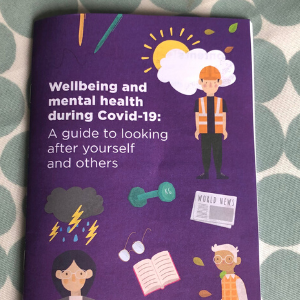
During the national lockdown which was in place in the first half of 2020 to ‘flatten the curve’ and stop the spread of COVID-19, many people struggled with its impact on their mental health. As we head into a further national lockdown, you might be worried about how you and those you love will cope.
But there are simple and effective ways to help yourself – and others – to feel better. We are sharing the top ten things we can all do to look after our mental wellbeing during these difficult times.
Looking after yourself
1. Be kind to yourself. The most recent Mental Health Awareness Week focussed on the theme of ‘kindness’, and we shared a list of simple ways to be kind to yourself during the COVID-19 pandemic. Lots of us struggle to treat ourselves kindly. In fact, we’re often nicer to others than we are to ourselves. Show yourself compassion when things aren’t going well, try to put less stress and pressure on yourself, and take a few minutes to focus on your good qualities.
2. Get outside. We know it’s much harder when the days are shorter and colder, but there’s a wealth of evidence that being in daylight and visiting any green, leafy spaces near you can really boost your mood. So wrap up warm, and try and get outside in your local area. Enjoy the crisp autumnal leaves or watch the sunset.
St Nicholas Hospital – blue
St Nicholas Hospital – yellow
St George’s Park – yellow
Hopewood Park – blue
Hopewood Park – yellow
Walkergate Park
3. Get moving any way you can. Although gyms and leisure centres have closed, many people are taking up cycling, regular walks around their neighbourhood, and of course at-home workouts (maybe you joined in with PE with Joe Wicks?). Moving more is good for your mind and body. Find an activity that you enjoy, and make it part of your daily routine. Our A Weight Off Your Mind webpages have lots of resources to help you find a physical activity that’s right for you.
4. Get a good night’s sleep. In May, research showed that more than four in 10 adults have been experiencing trouble sleeping during the COVID-19 pandemic. If you’re struggling to sleep due to worry or stress, that’s understandable – take a look at our Sleeping Problems self help guide to find techniques that might help. Our relaxation tracks can help you to let go and drift off. Public Health England’s Every Mind Matters website also includes NHS-approved expert tips and advice on improving your sleep.
5. Look out for burnout. Many of us are working harder than ever. If you’re working from home, it can be hard to switch off from work, and you don’t have colleagues around to stop and have a break with. If you still have to go into work, or are returning to work, this can be filled with anxieties too. The Mental Health Foundation have a useful webpage with advice on looking after your mental health while working during coronavirus which covers these topics and more.
6. Focus on hobbies that you enjoy, or learn something new that you can enjoy during the restrictions. Learning new things can give you a sense of achievement that helps you feel better about yourself and boost your mood. You can take up a new activity and learn new things at any age; it’s a good way to occupy yourself while many of us are stuck at home and can’t do the hobbies we might usually enjoy. Maybe there’s a hobby you used to have that you can revisit at home, like drawing or knitting? There’s all sorts of online courses, videos, library books, and TV programmes which can teach you something new. It can be something as big or small as you feel comfortable with – from learning a new language, to reading some articles that interest you, or cooking a new recipe. Set a goal that you feel comfortable with.
Looking out for others
7. Be kind to others. The first national lockdown saw a flurry of kind community spirit – people left notes offering help to their neighbours, and drew rainbows to display in their windows, providing hope and joy through the difficult times. Get involved any way you can, however small. Simply checking on a friend can make a huge difference to their day. It will boost their mood, and yours too.
8. Where restrictions allow, visit loved ones who need you. If your loved one is currently being cared for in one of CNTW’s wards or units, you can still visit them during this lockdown – so long as you take the right precautions. We know how vital these visits are to people’s wellbeing. (Please contact the relevant ward team to discuss visiting procedures with them ahead of time.) You can also still visit people in your support bubble at the moment. (Read about who can be in a support bubble and how it works.)
Getting help early
9. Find out where to seek help if you or someone you know is struggling. If you need urgent help with your mental health, our Freephone crisis phone numbers are available 24/7. The North East and North Cumbria Suicide Prevention Network also has a directory of services, helplines and resources that might be useful to you.
10. Remember that the NHS is still here for you. All of our specialist services are still taking referrals and supporting people. If you have a healthcare appointment, please keep it. Some things may look and feel different, but we are doing our best to support you safely, and if you’re worried about something you can still seek help. You shouldn’t put off seeing a doctor about a physical health condition, and the same goes for your mental health: the earlier you seek help, the better.
 For more advice on looking after your mental health during lockdown, check out this simple guide to looking after yourself and others produced earlier this year by the North East and North Cumbria Suicide Prevention Network.
For more advice on looking after your mental health during lockdown, check out this simple guide to looking after yourself and others produced earlier this year by the North East and North Cumbria Suicide Prevention Network.
